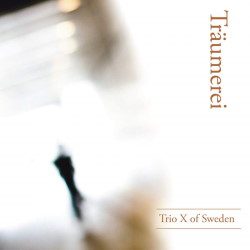 BUY NOW Presto Music |
Träumerei |
I like the places where the classical music and the jazz meet. Of the many classical-based jazz albums that I have heard, this one by the Trio X of Sweden is certainly one of the best. The numbers are based on well-known classical pieces, but the makeover is so respectful and resourceful at the same time, that I can’t imagine a lover of either classical music or jazz that might remain unimpressed.
Some numbers are more like jazzy versions, where the original melody is unchanged. Others, with a more improvisatory feeling, follow the harmonic path and are bolder to step away from the original. The presence of both approaches adds to the variety and the appeal of the album. I was reminded of the sound of Oscar Peterson’s Trio, though here the sound is less piano-centered: the double bass is audible and gets enough place in the limelight, and the percussion is often tender, against its percussive nature, and surprisingly adds color – not something usually associated with drums.
The opening tracks, Schumann’s Traumerei, does not only give the name, but sets the mood for the entire album: the unhurried atmosphere of a lazy afternoon, positive and calm. Next comes Peterson-Berger’s tranquil Frösö Church, which glitters like ripples on a stream on a sunny day. There are three tracks with the music of Swedish composers, and these new acquaintances are welcome, as they are beautiful and stand well among other gems of the set. Alfvén’s number, with its mixture of minor and major keys, is especially rich and satisfying on many levels, and turns out to be some really good jazz.
Purcell’s Sound the Trumpet is a powerful joy-setter, six minutes of pure happiness. In Mussorgsky Promenade, the double bass keeps the melody down below, while the piano improvises adventurously over it. The trio preserves the main idea of Ravel’s Bolero, translating it into jazz language: the steady, inexorable growth, the increase of density, which is practically imperceptible locally but noticeable on the big scale, and is accompanied by a constant shifting of colors.
An unexpected transformation happens to Chopin’s Prelude. Its long notes, pauses and sighs happen to be a pliable material for jazz, and with the swaying syncopated rhythm it turns almost into a melancholic bossa-nova, not far from Jobim’s Insensatez, at the same time getting some French perfume a-la Michel Legrand. They swing it just like Jacques Loussier is swinging Bach’s sarabandes, and you get an exquisite piece of smoky evening jazz. The three constituents of the good jazz – the thematic base, the development, and the performance – are all excellent here.
The superposition of triple and quadruple rhythms in the Moonlight Sonata creates a rolling sensation that mesmerizes. The decision to combine Mozart’s Lacrimosa with Bellman’s Epistel was fruitful: this is probably the most striking and emotionally deep track of the album. It combines the steady enthralling progress of a passacaglia with poignant personal lyricism; the ending has Handelian solemnity and serenity. In the two evergreen Airs by Bach, the melody is left almost untouched. “Nobody swings like Bach”, said Glenn Gould, and indeed not much seems to be needed to uncover the essential jazziness of this music. The alteration here is more about shifting the accents a little, and of course about the steady rhythmic base.
I can listen to this disc for hours, absorbing every wonderful minute. The tracks are long enough to savor the music, yet not too long to get bored. The recording is very clear. All instruments are captured excellently, with a harmonious balance. The piano sound is neither too hard and dry, nor it is too soft and watery. The bass is sonorous, and the omnipresent percussion is never over the top. The disc has practically no liner note: there are literally three sentences about the group, and five sentences provided by the members of the trio.
Oleg Ledeniov
Disc contents
Robert Schumann (1810-1856)
Träumerei - From Kinderszenen Op. 15
Wilhelm Peterson-Berger (1867-1942)
Vid Frösö kyrka (At Frösö Church) - From Frösöblomster (Frösö Flowers)
Henry Purcell (1659-1695)
Sound the Trumpet, Beat the Drum – From the Welcome Ode for James II
Johann Sebastian Bach (1685-1750)
Aria - From The Goldberg Variations
Modest Mussorgsky (1839-1881)
Promenade - From Pictures at an Exhibition
Ludwig van Beethoven (1770-1827)
Moonlight Sonata - Piano Sonata No. 14 Op. 27, 1st Movement
Hugo Alfvén (1872-1960)
Roslagsvår / Swedish Polka
Maurice Ravel (1875-1937)
Boléro
Fryderyk Chopin (1810-1849)
Largo - From Preludes Op. 28
Wolfgang Amadeus Mozart (1756-1791) / Carl-Michael Bellman (1740-1795)
Lacrimosa - From Requiem K. 626 / Drick ur ditt glas, Epistel No. 30
Johann Sebastian Bach
Air - From Orchestral Suite No. 3 BWV 1068